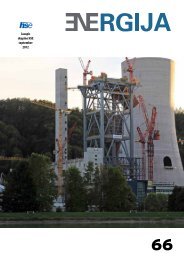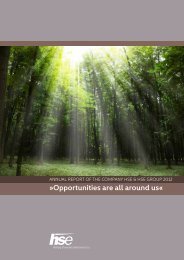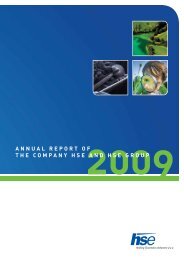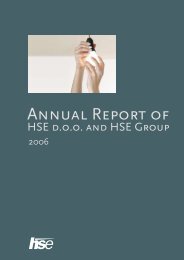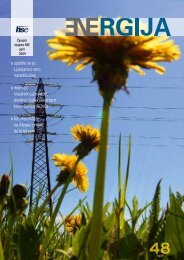ANNUAL REPORT - HSE
ANNUAL REPORT - HSE
ANNUAL REPORT - HSE
Create successful ePaper yourself
Turn your PDF publications into a flip-book with our unique Google optimized e-Paper software.
2.4 Strategic<br />
orientations of the<br />
<strong>HSE</strong> Group<br />
European energy policy<br />
With the adoption of the climate and energy package,<br />
the future European energy policy was given a formal<br />
legal framework at the end of 2008. To ensure sustainable<br />
future, the EU set itself the following binding<br />
goals for the period of up to 2020:<br />
• to decrease the envisaged energy consumption by 20%,<br />
• to increase the share of RES in total energy consumption<br />
to 20%,<br />
• to reduce greenhouse gas emissions by at least 20%,<br />
• to increase the share of biofuels to at least 10% of<br />
total motor fuel consumption.<br />
New energy production methods will decrease the<br />
EU's dependence on the imports of fossil fuels, but<br />
oil, natural gas and coal will probably remain an important<br />
part of the fuel mix for a few more decades.<br />
The EU supports this energy policy through additional<br />
investments, extensive research and development<br />
funding, and development and transfer of new technologies<br />
into general use.<br />
<strong>HSE</strong> Group’s orientations<br />
The <strong>HSE</strong> Group is facing a period in which adjusting to<br />
the European energy policy will be a priority strategic<br />
area of business.<br />
Its conduct of business will have to be adapted to the<br />
changed legislative framework, structural challenges<br />
and rapidly changing market conditions. The latter<br />
are mainly affected by changes in the markets of SE<br />
Europe, Slovenia’s and EU's increasing energy dependence<br />
on imports, and the calls for improved environmental<br />
responsibility.<br />
Ensuring the production of electricity from RES and<br />
lowering greenhouse emissions in the production of<br />
electricity from fossil fuels play an important role in<br />
meeting the requirements of a sustainable energy policy.<br />
Such orientation of the production capacities of the<br />
<strong>HSE</strong> Group has already been laid down in the development<br />
plan of the <strong>HSE</strong> Group for the period 2006-2015.<br />
The conditions brought about by the global financial and<br />
economic crisis require the <strong>HSE</strong> Group to reconsider its<br />
investments in the new production capacities in light of<br />
changed electricity prices and devote even more attention<br />
to obtaining sufficient funds for the implementation of<br />
<strong>HSE</strong> Group’s development projects. The basic guidelines<br />
for the future development are expected to be defined at<br />
the 6th Strategic Conference of the <strong>HSE</strong> Group in the first<br />
half of 2009, when the bases for supplementing the already<br />
adopted development plans will also be known.<br />
A balanced combination of production sources with<br />
emphasis on RES, use of domestic energy sources<br />
and integration of the European energy market laid<br />
down in the third energy legislation package represent<br />
a foundation for the future strategic orientation<br />
of <strong>HSE</strong>'s operations.<br />
In implementing its business policy, <strong>HSE</strong> will continue<br />
to strive for maintaining the leading position of the <strong>HSE</strong><br />
Group within the Slovene energy system, thus responsibly<br />
ensuring secure and reliable electricity supply in Slovenia.<br />
It will maintain the planned growth of the company's<br />
and group's operations to the extent and at the speed at<br />
which growth and development were pursued until now,<br />
and achieve operating results that will benefit all our key<br />
stakeholders: the owner, employees, business partners,<br />
and the community into which it is integrated.<br />
2.5 Quality<br />
management<br />
system policy<br />
The quality management system policy combines<br />
quality, environmental management and occupational<br />
health and safety. The management system manual<br />
complies with the standards ISO 9001:2000, ISO<br />
14001:2004 and OHSAS 18001:1999.<br />
The overall system is based on the following principles:<br />
• responsibility for the execution of specific tasks and<br />
the related clearly established authorisations,<br />
• responsibility for the achievement of objectives concerning<br />
quality, environmental management and occupational<br />
safety,<br />
• each individual, irrespective of their position, is<br />
responsible for the implementation of objectives<br />
concerning quality, environmental management,<br />
occupational safety and information security in accordance<br />
with their responsibilities and authorisations.<br />
<strong>ANNUAL</strong> <strong>REPORT</strong> <strong>HSE</strong> | BUSINESS <strong>REPORT</strong><br />
45




